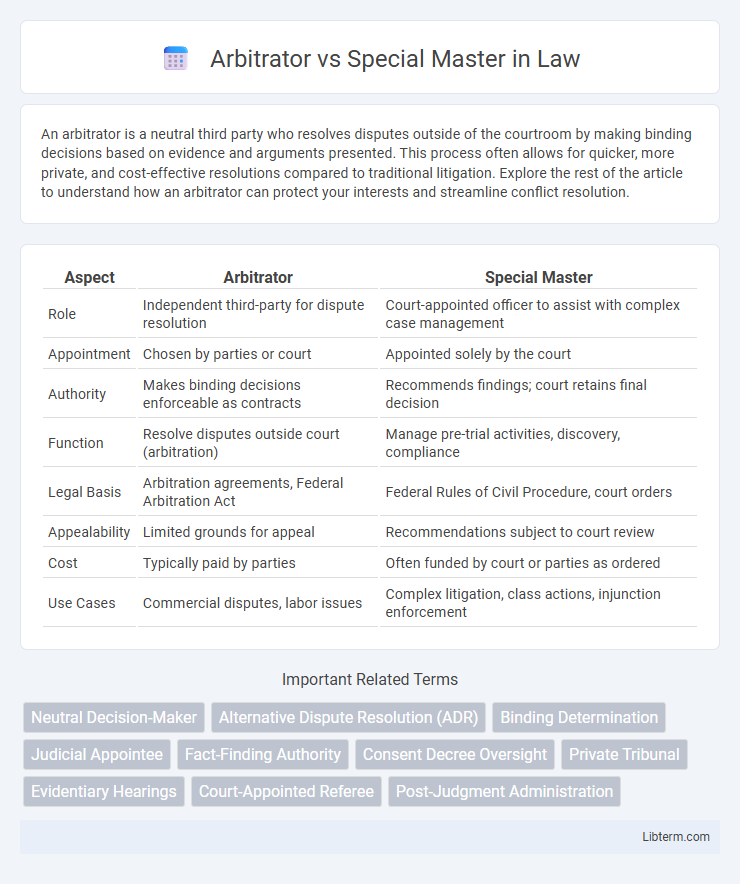An arbitrator is a neutral third party who resolves disputes outside of the courtroom by making binding decisions based on evidence and arguments presented. This process often allows for quicker, more private, and cost-effective resolutions compared to traditional litigation. Explore the rest of the article to understand how an arbitrator can protect your interests and streamline conflict resolution.
Table of Comparison
| Aspect | Arbitrator | Special Master |
|---|---|---|
| Role | Independent third-party for dispute resolution | Court-appointed officer to assist with complex case management |
| Appointment | Chosen by parties or court | Appointed solely by the court |
| Authority | Makes binding decisions enforceable as contracts | Recommends findings; court retains final decision |
| Function | Resolve disputes outside court (arbitration) | Manage pre-trial activities, discovery, compliance |
| Legal Basis | Arbitration agreements, Federal Arbitration Act | Federal Rules of Civil Procedure, court orders |
| Appealability | Limited grounds for appeal | Recommendations subject to court review |
| Cost | Typically paid by parties | Often funded by court or parties as ordered |
| Use Cases | Commercial disputes, labor issues | Complex litigation, class actions, injunction enforcement |
Understanding Arbitrators and Special Masters
Arbitrators are impartial third parties who resolve disputes outside court by making binding decisions based on the evidence and legal arguments presented. Special Masters assist judges by managing complex case issues, conducting investigations, and providing expert recommendations to facilitate informed rulings. Both roles require neutrality and expertise, but arbitrators deliver final judgments while special masters support the judicial process with detailed analysis and fact-finding.
Key Responsibilities of Arbitrators
Arbitrators primarily resolve disputes by reviewing evidence, conducting hearings, and issuing binding decisions based on contract terms and applicable law. They function as private judges in alternative dispute resolution processes, ensuring fair and impartial adjudication outside the court system. Their key responsibilities include evaluating facts, applying legal standards, and drafting comprehensive arbitration awards enforceable by courts.
Roles and Functions of Special Masters
Special Masters assist courts by managing complex or technical aspects of litigation, overseeing discovery, and ensuring compliance with court orders. Unlike arbitrators who resolve disputes by rendering binding decisions, Special Masters act as extensions of the judge to facilitate case management and fact-finding. Their roles include conducting hearings, preparing reports, and recommending solutions to streamline the judicial process.
Appointment Processes: Arbitrator vs Special Master
Arbitrators are typically appointed by mutual agreement of the disputing parties or, failing that, by an appointing authority such as an arbitration institution, following predefined rules and criteria to ensure neutrality and expertise. Special Masters are usually appointed by a court, often requiring judicial approval, and are selected based on specific expertise relevant to ongoing litigation to assist the court with complex matters or fact-finding. The appointment process for arbitrators emphasizes party autonomy and contractual terms, while Special Master appointments are governed by judicial discretion and statutory or procedural rules.
Legal Authority and Jurisdiction
An arbitrator holds binding legal authority granted by contractual agreement or statutory law to resolve disputes and issue enforceable decisions outside traditional courts. A special master is appointed by a court with limited jurisdiction to oversee specific aspects of complex litigation, such as gathering evidence or managing compliance, but their authority is subject to judicial approval. While arbitrators operate independently with the final say in dispute resolution, special masters act as assistants to the court, providing recommendations rather than definitive rulings.
Types of Cases Handled
Arbitrators primarily handle commercial disputes, contract issues, labor disagreements, and international trade conflicts, offering binding resolutions outside court. Special Masters are appointed in complex litigation involving technical or procedural matters such as class action lawsuits, patent disputes, and compliance monitoring. Both roles facilitate case management, but Special Masters often address detailed fact-finding and ongoing oversight in federal court cases.
Decision-Making Powers and Limitations
Arbitrators possess binding decision-making powers, allowing them to render final judgments that resolve disputes without court intervention, whereas special masters have more limited authority, typically assisting the court by conducting investigations or managing specific issues without issuing ultimate decisions. Special masters act under the court's supervision and their recommendations require judicial approval to become enforceable, reflecting their auxiliary role. The scope of arbitrators' powers generally encompasses the full resolution of disputes, while special masters focus on fact-finding and facilitating complex litigation processes.
Procedural Differences
Arbitrators conduct binding dispute resolution proceedings with formal rules, often allowing limited discovery and evidence presentation similar to a court trial. Special Masters serve as auxiliary officers appointed by judges to oversee specific procedural tasks, such as managing discovery, conducting hearings, or making recommendations without issuing final judgments. The procedural scope for Special Masters is typically narrower and court-supervised, while Arbitrators operate independently with authority to render final decisions.
Benefits and Drawbacks of Each Role
Arbitrators provide a binding resolution to disputes with the benefit of finality and confidentiality, offering a streamlined process compared to court litigation; however, their decisions limit appeal options, which can be a drawback if parties seek further review. Special Masters assist courts by managing complex issues and facilitating discovery, benefiting from judicial authority to enforce compliance, yet their role can increase procedural costs and extend timelines due to additional layers of oversight. Choosing between an arbitrator and a special master depends on whether parties prioritize binding resolutions and efficiency or judicial guidance and detailed case management.
Choosing the Right Neutral for Your Dispute
Selecting the right neutral for your dispute involves understanding the distinct roles and expertise of an arbitrator versus a special master. Arbitrators are impartial adjudicators who render binding decisions in arbitration proceedings, typically suited for disputes requiring final and enforceable resolutions. Special masters serve as court-appointed experts managing complex issues, fact-finding, or overseeing specific aspects of litigation, making them ideal when specialized knowledge or ongoing supervision is necessary.
Arbitrator Infographic

 libterm.com
libterm.com